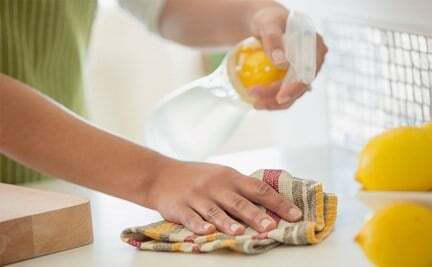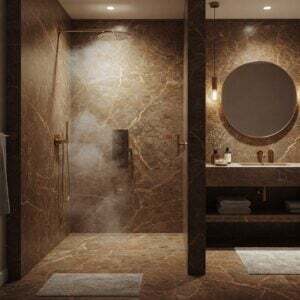Marble is a magnificent natural stone for use in and around your home. Whether it’s in the form of a kitchen benchtop or a bathroom vanity, the luxurious look and practical durability of marble is what truly makes it a winning option.
However, as far as construction materials and even natural stone go, marble is among the more porous of options. This means that it can be more susceptible to staining, especially if you’re using it as a countertop where it’s likely to be exposed to food, liquid and a significant amount of activity.
An important component to knowing how to remove stains from marble is understanding how to prevent damage in the first place. After all, preventing stains is the ideal solution.
Preventing Water Stains, Oil Stains and More on Marble
Sealing
Professional sealing, and subsequent resealing every 3 to 5 years, is a very effective way to keep your marble looking and functioning as good as new for long into the future. Not only do sealants make this porous stone more resistant to staining, whether it’s oil, water or wine, but it also helps improve its resistance to scratches and abrasion.
While there is going to be a cost in having your marble benchtop sealed and resealed, it’s well worth the investment considering how long lasting and durable marble can be.
Maintenance
Simple and quick daily cleaning habits can help maintain your marble stone and prevent stains from occurring. Avoid hard chemicals and abrasive sponges when you’re wiping down any marble. Use warm, soft and safe-for-stone soap only with a microfibre or similarly soft material cloth.
A simple wipe down at the end of the day will go a long way to ensuring your marble remains sparkling and unblemished.
Clean up spills
It can be difficult to know how to get stains out of marble, especially stains that have set in and dried. That’s why it is always recommended that when an accident happens–and let’s face it, they do happen–you mop up the spill as soon as possible.
Remember to blot a spill first to soak up as much liquid as possible. If you try to wipe it off strai
Protective accessories
If you have a marble table or countertop, make sure you have coasters, heat pads and other helpful kitchen accessories. By placing mugs of coffee, tea cups and hot pans, trays and dishes onto these protective items you’ll prevent heat stains and other potential damage from being caused to the precious marble underneath.
How to Remove Stains From Marble
If you miss a spill or don’t manage to clean it up quick enough, you might find your marble has suffered a bit of a stain. There are different ways to remove stains from marble depending on the type of stain.
If you’re in doubt, it’s always best to be safe rather than sorry. Make sure to contact the team here at Euro Marble for advice or bring in a professional to get rid of the stain for you.
If you do want to tackle the stain removal yourself, here’s a guide on what to do.
How to Remove Organic Food Stains From Marble
For most organic food stains, you should use a solution that contains 12% hydrogen peroxide and just a couple of drops of ammonia. Use warm water and a clean, soft cloth and gently apply the solution to the stain. Make sure the marble is completely dry after you wipe the solution away.
How to Remove Oil Stains on Marble
For oil stains, or anything stained from liquid with an oil base, use a special stone liquid cleanser. Be careful not to use any detergent that contains harmful chemicals or has high levels of acidity.
How to Remove Water Stains From Marble
Water stains are generally removed using white vinegar (at least when it comes to household cleaning solutions) but it’s best to avoid any acidic substances when working with marble. That’s why we recommend baking soda. The key to knowing how to remove stains from marble with baking soda is to remember to expose your stone to the substance for short periods of time only.
When you do try to get rid of the water stain, rub the baking soda into the stain thoroughly. Rinse it off straight away without leaving it to sit and cause further damage using warm water and a soft, clean cloth. Then make sure you dry the stone completely, but do not press too hard or rub too vigorously as this can also cause further damage.
Using Poultice
Many marble stains can also be removed quite effectively using a simple homemade solution called a poultice. In essence, a poultice is just a thick paste that can be applied to the stained marble and that then draws out the stain when removed.
The basic method of creating a poultice is to combine a marble-safe solvent with water or baking soda. Depending on the type of stain you are treating (see above) you might want to add in some hydrogen peroxide or the like. Once the ingredients are mixed together, keep mixing it until it turns into a thickened paste.
The poultice can then be applied to the stained area. Make sure it is cleaned beforehand but that the marble is slightly damp. Once applied, seal it with some plastic wrap and leave it for between 24 and 48 hours. Then remove the poultice carefully using a plastic or wooden spoon so that you don’t scratch the stone, and wipe down the surface with a soft, damp cloth. Lastly, make sure that the marble is completely dry.
Euro Marble – your one point of call for all things marble
If you’re still unsure how to remove stains from your marble countertop or you would like professional assistance, make sure to contact our team today. We’re always here to help you out and take great pride in ensuring our customers love every square centimetre of their marble, stains and all!





